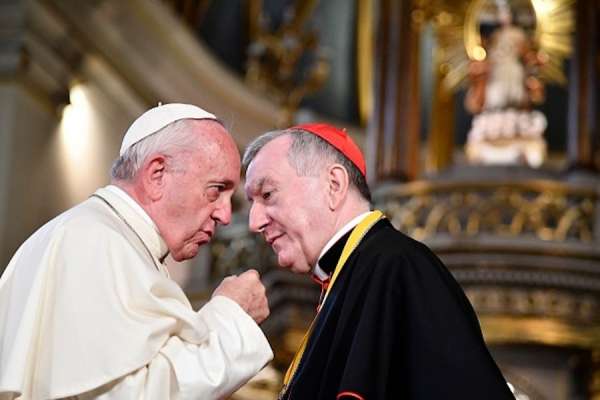Analysis: Vatican finances and Cardinal Parolin's crisis of credibility

On Saturday, the ongoing saga of the Vatican financial scandal - or reform, if you prefer - continued with the approval of several new changes to the Vatican City law on transparency and economic control.
It also included the announcement that Cardinal Pietro Parolin will no longer sit on the reconstituted supervisory board of the Institute for Religious Works (IOR), commonly called the Vatican bank - the first time the Secretary of State will not have a seat. That announcement is one of many indications that the cardinal and his department, both at the center of the Church's governance for years, could lose influence and trust with Pope Francis.
Cardinal Parolin, so far, has largely stayed away from the financial storm surrounding the curial department he heads, while the ongoing investigation has claimed the jobs of at least six former senior officials and has seen a dramatic fall from grace for his former deputy head, Cardinal Angelo Becciu.
Parolin himself has - so far - attracted little scrutiny for his role in overseeing the financial operations of the curia's most central and politically powerful department. But circumstances have begun to suggest that he may soon face difficult questions about his work and the oversight of the Vatican Secretariat of State.
Much of the Vatican finance coverage has focused on Cardinal Becciu's role during his time as a substitute at the Secretariat of State. Becciu is, in fact, at the heart of many, if not all, of the financial transactions under consideration. But in a recent interview, Enrico Crasso, an Italian businessman charged with investing millions in Vatican funds, noted that Becciu's authority to act was granted him directly by Parolin.
Over the weekend, the Financial Times reported that the Secretariat of State had sold nearly 250 million euros in charitable assets to pay off debts incurred by Becciu while engaged in speculative investments such as the infamous London property deal. Those loans were the subject of considerable clashes between Becciu and the former Vatican finance chief, Cardinal George Pell.
"When Becciu asked for funding for the London building, he presented a letter from Cardinal Pietro Parolin ... saying Becciu had full powers to exploit the entire estate," Crasso told Corriere della Sera at the beginning of this. month.
It is not the first time that Parolin has taken personal responsibility for Becciu's controversial projects.
In 2019, Parolin told CNA he was personally responsible for organizing a controversial grant from the U.S.-based Papal Foundation, despite reports circulating among Vatican officials crediting the affair to Cardinal Becciu.
The grant was intended to cover part of a € 50 million loan to the secretariat from APSA, the Holy See's sovereign wealth manager and central reserve bank, to finance the 2015 purchase of a bankrupt Catholic hospital in Rome, the IDI.
The APSA loan appeared to violate Vatican financial regulations, and while American donors were told that the funds were intended for the hospital itself, the exact destination of around $ 13 million remains unclear.
Through his rare interventions on Vatican financial scandals, Parolin has developed a reputation for taking personal responsibility for the problems created by his subordinates, advancing his credibility to cover up the mistakes made in his department. But now it looks like he may not have enough credit to cover the growing account.
In addition to the weekend announcement that Parolin had been banned from the IOR's supervisory board, effectively excluding him and his department from monitoring the bank, the cardinal was also banned from another key financial oversight council by the pope the week. before.
On October 5, Pope Francis chose Cardinal Kevin Farrell, the Cardinal Chamberlain, to oversee the Confidential Matters Commission, which monitors financial transactions that do not fall under normal Vatican regulations.
Farrell's selection, who famously shared an apartment with Theodore McCarrick for several years without ever suspecting anything of the disgraced former cardinal's behavior, is not obvious for a job that will require careful scrutiny of complicated cases. That the pope felt compelled to choose him for the role makes Parolin's omission from the commission even more evident.
These pope decisions, and the announced changes to the Vatican finance bill, were made in the midst of Moneyval's two-week on-site inspection of the Holy See, and the importance of ensuring a favorable review is hard to overstate. A sufficiently damning report could see the Holy See threatened by an international blacklist, which would be disastrous for its ability to function as a sovereign international authority.
Supporters of Parolin, and of the role of the Secretariat of State in general, have advanced the argument that much of the coverage of the Vatican financial scandals is, in effect, an attack on the Holy See's judicial independence.
But with a string of scandals now affecting seven former senior members of the Secretariat of State, some Vatican observers ask whether the pope can now see Parolin, and the department he heads, as a responsibility to protect that independence.